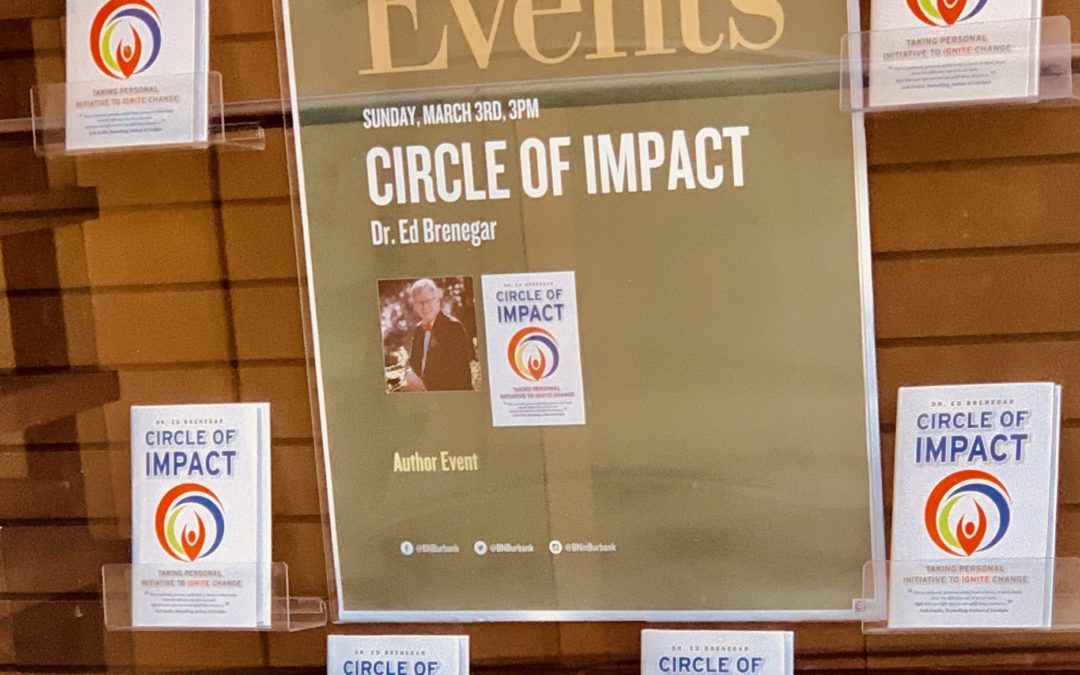
by Dr. Ed Brenegar | Oct 6, 2020 | Book, Circle of Impact, Ideas, Impact, Relationships, Structure, Transition
In September 2018, after Circle of Impact was published, I hit the road to promote sales of the book. I spent the next year talking to people standing in bookstores, sitting at bars, in laundromats, parking lots, and hotel lobbies. These conversations went something like this.
“Oh, so you are the author of this book?”
“Yes.”
“What’s your book about?”
“It is a book for people and organizations that are in transition.”
Then they would give me a surprised look and say, “Oh. … Well. … That describes me.”
Then a conversation would happen where they would tell me a story about who they are, their life experience, and why they felt they were in transition.
I found that people first feel that they are in transition. But they lack a way to talk about it. This feeling rises deep from within themselves. This is especially true if they have either worked in an environment described above where they are simply hired to perform specific tasks or have been out of the workforce for a while taking care of family needs, whether children or elderly parents.
Of all the ways that I could describe the book, speaking about transition resonated most significantly with people. This isn’t just personal. It is also something happening to our society, our communities, and every organization within it. It is a global reality felt at the most intimate level of our lives. It is also clear that some people are better suited or prepared to make transitions in their lives, while for others it is a very tough, hard experience.

by Dr. Ed Brenegar | May 7, 2020 | Book, Circle of Impact, Uncategorized
It is important to know what you have to offer, as I wrote about previously. However, that is not everything you need to know. At best, it is 30-40% of what you need to know.
Too many times I’ve met with someone who is trying to sell me their services, and all they tell me is what they are selling. The only offer is for me to give them my money.
Every day people connect with me online to sell me services. They is no indication of the impact that they aim to create for me. In one of those conversations, I asked one guy how he would market to people and businesses in transition. He was honest. He had no idea. He said that his firms markets to the titles in an organization.
To fully understand what you have to offer, you need to be aware of three areas that are important.

by Dr. Ed Brenegar | Apr 27, 2020 | Book, Circle of Impact, Ideas, Transition
“It is vitally important that we understand what change is. It is the living, dynamic context of our lives. Every thought, every emotion, every action, every response in a particular moment operates within a change context. Every movement, shift in perspective, or initiative taken happens within the context of change. …
I call it the speed of change.

by Dr. Ed Brenegar | Apr 25, 2020 | Brand, Circle of Impact, Impact, Questions, Uncategorized
“It is vitally important that we understand what change is. It is the living, dynamic context of our lives. Every thought, every emotion, every action, every response in a particular moment operates within a change context. Every movement, shift in perspective, or initiative taken happens within the context of change.
Change is so prevalent that we don’t even see it. It is invisible until it becomes toxic or threatening. Then, we see it or feel it so much that we want to get out of it. Change is always present. It is our best friend and our worst enemy.
The skill needed is a recognition that we are always in transition. It is not just a mental note that change is always present. It is seeing precisely what kind of change is happening in the moment. Did I anticipate my clients stepping back from the projects we had planned? I was not surprised. All around me were people I knew whose businesses were in crisis.”
Change is the context of our lives. The question is how do we embrace it.

by Dr. Ed Brenegar | Apr 22, 2020 | Book, Brand, Circle of Impact, Community, Fragmented, Ideas, Impact, Transition
One of the realities that the COVID-19 pandemic has exposed is the degree to which our culture has shifted in the type of consumerism which it promotes.
I remember back in the early 1980s listening to a NPR interview with a guy who had written a book about modern marketing philosophies. I remember it to this day because of the shift that he had noted began to take place during the 1960s. He described how for much of the 20th century marketing had been focused on shaming people into buying products.
Then a shift occurred where consumer product marketers began to promote products by telling people that they deserved to have it. Every time I think of this interview I remember the old McDonald’s jingle, “You deserve a break today…”.






